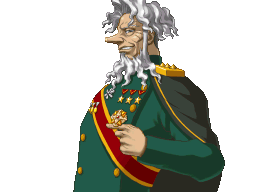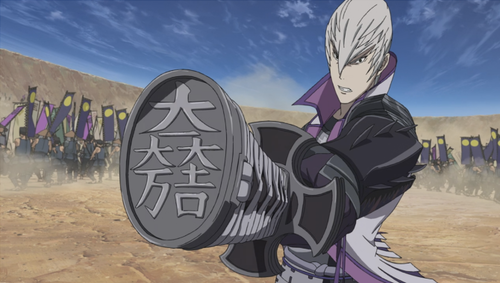Warning! This article is one giant spoiler
for every Ace Attorney game out! It is
practically a discussion of nothing but
spoilers. If you have not played through
every Ace Attorney game released, do not read this! I repeat!
Do not read this!
I’m a big fan of the Ace Attorney games. It and the Monkey Island
However, I seem to be the only one who was disappointed by the
latest game, Ace Attorney: Dual Destinies.
I really truly wanted to like it as much as the other games, but I
couldn’t. To get straight to the point and put it as simply as
possible: the writing wasn’t as strong, and for a game franchise that focuses
as heavily on writing as the Ace Attorney games, that’s like trying to walk
without a skeleton.
That’s not to say that Dual Destinies is bad. The dialogue is still clever and fun, and
even with all the complaining I’m about to do, there are a lot of great moments
to be had. I know that a certain Hoffman
will take an issue with this post, but please try to understand. My big problems with Dual Destinies can be
broken down into these key points:
- Anachronic
Order
The game starts with a very strong and gripping case that pulls
you in to see what happens next, but after the opening case, the game flashes
back to two almost entirely unrelated ones before getting back on track to the
storyline the first started, basically meaning the overall story just piddles
about before moving on.
The cases themselves are decent enough, but by interrupting
the main plotline established in the first case, it feels more like they get in
the way.
Trials and Tribulations did something similar with the first case taking place far in the past and the fourth being before that, but that was executed better for
two reasons:
- The first case was the conclusion, so you didn’t feel like there was unfinished business until it came up again in the story.
- Those cases were tied into the story and had meaning toward the overall plot, while the two prequel cases in Dual Destinies really have little to do with anything in the grand scheme of things.
I found myself enjoying Dual Destinies’ story much more when
I went back and played them in chronological order, which is how they should’ve
been handled in the first place.
- Shorter
Cases
None of the cases feel as big or quite as deep as in
previous games. In the Phoenix Wright
trilogy, cases could last up to three trial days, becoming more and more
complicated and interesting as they went along, allowing for a lot of great
twists and characters.
Dual Destinies’s cases only go on for two (real) trials at
the most for each chapter. I know the
longer cases from previous games could drag on, but getting through all the
deceit and convolution made the conclusions all the more satisfying. Dual Destinies’ comes too quick at times. Some people may consider it to be cutting the fat, but I feel like it's cutting the meat.
- Predictable
The Ace Attorney games have been the reigning champions of
damning plot twists, and while there are a lot of genuinely great twists in
Dual Destinies (Tenma Taro is a treasure!), too often I found myself figuring
things out long before the characters did, which really took me out of the
experience. When the characters acted
shocked at a revelation (seriously, they’re easily excited), my reaction tended
to be “duy.”
Take for example detective Fullbright. As the game went on, I grew suspect of his
relentlessly cheery demeanor. It was as
if he was hiding something, and with no background story ever explained, I
expected him to be a bad guy in the future, possibly the final case, and I was
right, sort of. They practically
flat-out tell you with one suspicious action in case 4.
I would have never suspected Gumshoe of this sort of thing
because over the course of the games, you get to know him. About his lifestyle, relationships, likes and
dislikes, ect. Fullbright is just that
cheery guy who comes out of nowhere and his whole “In justice we trust” schtick
is all you know about him. I guess you
could say it’s like being suspicious of clowns.
 |
| You aint as cool as gumshoe, pal! |
Then there’s the third case.
Right off the bat I strongly suspected Aristotle, and no, not just
because he had that creepy smile. I might have suspected him because I’ve seen too many detective stories, and I
know the writer’s trick in which a group of suspects are set up and it turns
out to be someone outside of them. Part of me also pointed at him because the Ace Attorney games
are usually fairly uplifting, and having the killer be one of three friends who really care about each other wouldn’t be the happy ending we usually see in Ace
Attorney games. With those thoughts in
my head, I essentially assumed it was Aristotle the entire time until something
came up that proved me otherwise to make me rethink things.
Nothing did. Not even after Athena kept saying only three could have done it following the "I am Spartacus!" moment.
Maybe I’ve seen so many episodes of Case Closed and played
so many Ace Attorney games that it takes too much to trick me now. Damn you Gosho Aoyama!
- Leaps
in reasoning/not thinking things through
The predictability wasn’t the only issue I had with case 3. Ignoring the fact that Klavier’s appearance
was practically a cameo any character could have done, I found the conclusive
facts toward the end of the case to be extremely suspect.
They claim Aristotle hid the body as a statue by posing it
like the statue of Phoenix
and covering it.
First of all, that would be nigh-impossible to balance if
all you did was tie her hands and feet.
Have you ever tried to balance a posable figure that way? It’s not easy. Now consider how hard that would be with
someone who probably weighs at least 150 pounds! Even with the ropes that would be fidgety as
hell!
Second of all, they don’t even mention rigor mortis. I didn’t major in criminal justice or biology, but unless I’m mistaken, in order to prop up the body in the way he did, he’d have to stand there and hold it in place until it stiffened, and even then, wouldn’t it have softened up again as time passed? They only mention that rigor mortis softened up by the time they found her once. Just a little bit more explanation on that would have been appreciated.
Second of all, they don’t even mention rigor mortis. I didn’t major in criminal justice or biology, but unless I’m mistaken, in order to prop up the body in the way he did, he’d have to stand there and hold it in place until it stiffened, and even then, wouldn’t it have softened up again as time passed? They only mention that rigor mortis softened up by the time they found her once. Just a little bit more explanation on that would have been appreciated.
It’s those little moments of the writers not thinking things
through that bother me in this game:
What’s wrong with a boy liking to wear dresses? That doesn’t mean he’s a girl.
Why are the police not coming to save us from the robot
holding us against our will? They can
deal with hostage situations. And why do
the characters consider that trial on the record? It’s unofficial! They specifically state as much!
Only someone with no fear could make that jump? What about someone with training? Maybe they practice jumps like that all the time. Jumping to the conclusion that they don’t
have any fear is quite a stretch.
And speaking of the man without fear…
5. Weak final villain
Every Ace Attorney game has some kind of twist on its final case
that makes it go out with a bang.
In the first game you accused the prosecutor of murder in an
entirely different case (and uncovered a huge conspiracy in the DS-exclusive
case).
In Justice for all you defended a guilty client.
In Trials and Tribulations your friend purposefully worked
against you, you dealt with an evil spirit, and you got to play as Edgeworth
for a bit.
Apollo Justice had the time traveling gimmick for its final
case as well as having the murderer already be in jail, and in Ace Attorney
Investigations you went up against a very persistent ambassador with diplomatic
immunity who happens to be the mastermind of the smuggling ring. That last one is probably my favorite.
 |
| Pimpin'. |
In Dual Destinies, you just go up against someone who
supposedly doesn’t have emotions. It
feels like a forced way to make the finale play into the mood matrix system,
and it’s revealed in the end that he has emotions anyway after he breaks rather
easily, so his one character trait is ultimately a sham, making him just another
criminal. Plus, part of what made other criminals like
Calisto Yew and Dahlia Hawthrorne effective is that they were established, and even the villains that only had one episode took time to show the kind of person they were. The Phantom's introduction just comes out of nowhere and feels shoehorned in. I like the idea of the final villain being an international spy, but it wasn't built up well.
- Not
enough perceiving
I loved that they brought back Apollo’s ability to perceive,
but you only use it three or four times throughout the entire game. They seemed to have taken away from it to
focus more on Athena’s new mood matrix system.
The mood matrix is interesting and well-executed, but I find the
perceiving more fun because it requires you to be a lot more observant.
- Lack of concern
Multiple times in this game, the criminals do something that
should have them arrested or declared
guilty.
Apollo calls L’belle “annoying” after he tears up an
important piece of evidence. That’s not
annoying, that is a felony! At that point Apollo has every right to call
detective Fullbright and give L’belle his own pair of shock cuffs, then have him questioned as to why he did that in a dark room with only one light... Alone with Batman!
And why is it more than once the villains drop their façade
and show themselves as a jerk? That’s
their way of saying “Now I’m serious!
Now I really have to give it my all!” I understand that, but they don’t have to give
their all just to tell the truth! That
can only mean they’re putting effort into lying! Even if the judge is stupid enough to think
they’re innocent and they’ve said they’re guilty in every way but legally, the
jury should still give them a guilty verdict!
What the hell happened to the jury system from Apollo Justice?!
 |
| Because you sure as hell look innocent, right? |
I know Matt Engarde did the same thing, but in that case all
he did was flip his hair and he didn’t constantly imply his guilt, even if he
did look sinister and did something bad in the past. Plus the jury system wasn’t established until
Apollo Justice anyway, and Engarde really didn’t
kill anyone, technically speaking.
8. Difficulty Drop
Some of the mechanics Dual Destinies changes are welcome, like removing the life bar for breaking psyche locks. However, giving the player the ability to continue from where they left off in the trials removes tension. What's the point of having that life bar if there's no penalty for draining it? At least in previous games you had to know where to save, you'd lose your health if you got overconfident and there was the threat of having to go through dialogue sequences again, which made you want to get it right the first time. Here, there is no threat of any kind except maybe bragging rights if you're one of those people.
Not that you should lose much health. The contradictions seem to have been made more obvious this time around, which refers back to my problem with the game being predictable. I swear you had to look at the evidence closer in the other games.
Not that you should lose much health. The contradictions seem to have been made more obvious this time around, which refers back to my problem with the game being predictable. I swear you had to look at the evidence closer in the other games.
9. Why download only?
There is no
reason for Dual Destinies to be a download-only title, and you probably have to shell
out for another SD card thanks to the (not literally) terrabytes of space it takes up. For the enjoyment I got out of it, I’d much
rather have it on a 3DS card instead of being forced by Capcom to clog up my memory space! We have these cartridges for a reason!
10. M???!!!
I don't hold this against the game, since this isn’t the game’s fault so much as it is the ESRB’s, but
I’m with the masses on one of the most common questions regarding it: why is this rated M?! It is no more violent, dark, or graphic than
any other game before it! It does nothing
different from the other games in terms of content, and every other Ace Attorney game is
rated T!
“Great oogly boogly!”
That’s some M-rated language right there!
 |
| Oh dear god that bird is gouging her eyes out!... Right? |
Maybe my expectations were too high after all the praise this game got. Maybe I expected too much of an Ace Attorney
game on a stronger system, but that doesn’t change that I had more fun playing
the other games than I did Ace Attorney: Dual Destinies, even if it is still enjoyable. That’s not going
to keep me from getting any future Ace Attorney games, of course. I’m still waiting for the official revelation
that Mitsunari Ishida is Blackquill's Ancestor.
And when the hell is Sengoku Basara 4 coming out?!




No comments:
Post a Comment